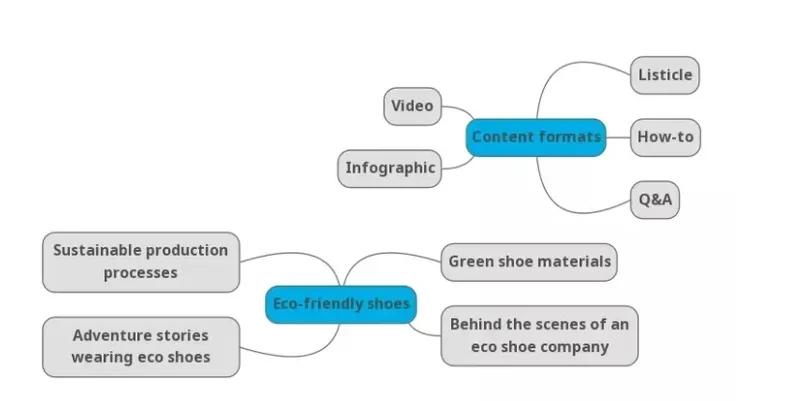Whatever your niche or industry, when it comes to marketing your goods or services, ideas are like gold dust.
But while coming up with head-turning content marketing strategies can earn you a very healthy return on investment (ROI) — and plenty of loyal fans — connecting with them isn’t always an easy process.
But, with the right mindset and a few tricks up your sleeve, you can come up with consistently epic content ideas that will set you apart from the pack.
Conjuring up the best content marketing ideas takes equal parts creativity and discipline.
And, by walking that fine line between the inspirational and the analytical, you’ll find your ideation sweet spot.
Your business needs a website.
Know your content marketing goals
To create content marketing ideas that offer value and deliver results, it's essential to understand what you aim to achieve.
Whether you're developing an original content idea for a single article, an entire multichannel marketing campaign, or anything in between, setting clear goals will form the foundation of your success.
Before you start brainstorming ideas, define the purpose you want your content to serve.
Rather than focusing on data or metrics at this stage, consider what you want your content to accomplish for your business.
Here are some ideas or angles to consider:
- Do you want to educate your audience on an emerging industry trend or subject?
- Do you want to drive your target audience toward a specific service or product?
- Do you want to boost brand awareness by leveraging an existing news trend?
- Do you want to answer a particular question or help solve a problem?
- Do you want to start a conversation to improve engagement and brand visibility?
- Do you want to enhance customer loyalty and encourage more sign-ups for your app or newsletter?
Ask yourself these key content marketing questions, seek the right answers, and you'll provide your content ideation process with the necessary direction from the very start.
Implement content strategy best practices

Content strategy provides a framework for creating, delivering, and governing content to meet business goals.
It involves understanding audiences, mapping content needs, optimizing findability, ensuring quality, aligning teams, and continually improving processes.
Adopting content best practices enhances the user experience, drives engagement, and boosts conversions across channels. A thoughtful, audience-focused content strategy is key to an impactful digital presence.
Document your content strategy
Create a comprehensive document outlining your content objectives, target audience, key messages, and distribution channels. This documentation ensures that all team members are aligned and that your content efforts are cohesive and strategic.
Create and maintain a content calendar
Develop a content calendar to plan and schedule your content production and distribution. A well-maintained calendar helps you stay organized, ensures consistent publishing, and allows you to strategically align content with key dates and marketing campaigns.
Ensure a consistent brand voice and visual identity
Maintain a uniform brand voice and visual style across all your content. Consistency in tone, language, and visual elements reinforces your brand identity and makes your content easily recognizable to your audience.
Present topics uniquely
Differentiate your content by presenting topics in unique and engaging ways. Use diverse formats such as videos, infographics, and interactive content to capture your audience's attention and stand out in a crowded market.
Stay updated with digital marketing trends
Continuously monitor and adapt to the latest digital marketing trends. Staying informed about new tools, platforms, and strategies enables you to keep your content marketing efforts fresh, relevant, and effective.
Repurpose old content into new formats
Maximize the value of your existing content by transforming it into different formats. For example, convert a popular blog post into an infographic, create a video summarizing key points, or compile several articles into an e-book.
This approach not only extends the lifespan of your content but also reaches different segments of your audience who prefer varied content types.
Diversify content types
Expand your content repertoire by incorporating a variety of formats such as blogs, videos, podcasts, infographics, and social media posts. Diversifying content types helps cater to different audience preferences and enhances engagement across multiple platforms.
Align content with distribution channels
Ensure that your content is tailored to the specific characteristics of each distribution channel. For instance, create visually appealing content for Instagram, in-depth articles for your blog, and concise updates for Twitter.
Aligning content with the strengths of each channel maximizes its impact and ensures it resonates with the intended audience.
Maximize reach and efficiency
Optimize your content strategy to achieve the widest possible reach without compromising quality. Utilize scheduling tools to automate postings, analyze performance metrics to identify successful content, and continuously refine your approach based on data-driven insights.
This ensures that your content marketing efforts are both effective and efficient, driving better results with less effort.
Avoid common content ideation pitfalls
Steer clear of ideation ruts by actively expanding perspectives — seek diverse voices, question assumptions, explore adjacent spaces, and approach challenges laterally to unlock creative, effective content solutions.
Ensure keyword optimization
Lack of keyword optimization can hinder your content's visibility. Focus on selecting relevant keywords that align with your audience's search intent. Use clear and specific language to naturally incorporate keywords into your content, enhancing its discoverability without compromising quality.
Align with marketing goals
Ignoring your marketing goals can lead to ineffective content. Clearly define your objectives, whether it's increasing brand awareness, generating leads, or boosting sales. Ensure that each piece of content supports these goals and contributes to your overall marketing strategy.
Fulfill title promises
Failing to deliver on the promises made in your titles can erode trust with your audience. Make sure that your content provides the value and information that the title suggests, maintaining consistency and reliability in your messaging.
Use specific headlines
Generic headlines fail to capture attention and engage your audience. Craft specific and compelling headlines that clearly convey the content's value and entice readers to explore further.
Align content with the sales funnel stages

A sales funnel is the customer journey from awareness to purchase and beyond. It consists of stages like reach, engagement, evaluation, and loyalty.
Businesses create tailored content to guide leads through the funnel, building relationships and meeting needs at each phase to convert prospects into delighted lifelong customers.
Awareness stage
In the first phase of the sales process, focus your content on the primary concerns of your target audience. Address their problems, challenges, and questions to effectively engage them.
Content in this stage should be educational, providing valuable advice without pushing for a sale. Examples include articles, blog posts, e-books, videos, and newsletters that inform and attract your audience.
Consideration stage
During the consideration phase, your content should blend helpful information with subtle marketing. Educate your audience on the features and benefits they should look for and how your offerings meet their needs.
This is the time to provide case studies, guides, instructional videos, and checklists that help your audience evaluate their options while keeping your products or services in mind.
Decision stage
When prospects are ready to make a purchase, your content should focus on convincing them why you are the best choice. Highlight your expertise, unique selling points, and the specific advantages of your products or services.
Effective content for this stage includes detailed case studies, user-generated content, buyer’s guides, product videos, and research reports that reinforce trust and facilitate the final decision-making process.
Develop a strategic distribution plan
A content distribution plan maps out where, when, and how to share content to reach target audiences effectively. It optimizes content for key channels like social media, email, SEO, and advertising.
A thoughtful distribution strategy amplifies content reach, expands engagement, drives conversions, and ensures content resonates with the right people at the right time.
Identify where your audience is most active
To ensure your content reaches the right people, determine where your target audience spends their time. Whether it's on specific social media platforms, industry websites, or through email newsletters, tailoring your distribution strategy to these channels will maximize your content's visibility and engagement.
Tailor content distribution accordingly
Once you've identified the preferred channels of your audience, customize your content for each platform. For example, share blog posts and articles on LinkedIn, create engaging visuals for Instagram, and use targeted email campaigns to reach subscribers.
Consistently adapting your content to fit the nuances of each distribution channel will enhance its effectiveness and reach.
Address sales objections through content
Effective content marketing not only attracts and engages potential customers but also addresses their concerns and objections. By anticipating common objections and proactively providing solutions within your content, you can alleviate doubts and build stronger relationships with your audience.
Incorporate FAQs, testimonials, and detailed explanations of your products or services to demonstrate how you overcome typical challenges and meet customer needs.
Different types of content marketing
Content marketing encompasses a variety of formats to effectively engage your audience. Here are some key types:
1. Blogs
Informative and engaging articles that provide value and establish your expertise.
2. Video
Compelling visual content that captures attention and communicates your message effectively.
3. Podcasts
Audio content that reaches listeners on the go, offering valuable insights and discussions.
4. Social media
Platforms to share your content and interact with your audience directly.
5. Infographics
Visually appealing graphics that present data and information in an easily digestible format.
6. Listicles
List-based articles that are easy to read and share, highlighting key points or tips.
7. How-to guides
Step-by-step guides that help your audience solve specific problems or achieve certain goals.
8. Thought leadership pieces
Articles that share your insights and perspectives, positioning your brand as an industry leader.
9. "Versus" articles
Comparative pieces that help your audience make informed decisions by evaluating different options.
10. Pros and cons articles
Balanced discussions outlining the advantages and disadvantages of particular choices, providing clear information to your readers.
Transform your content marketing ideas from average to epic
With your content marketing goals set and your best sources of inspiration in place, you're ready to transform your core ideas into something that will excite, amaze, and inspire your audience. Let's explore how you can achieve this.
Mind-map and brainstorm your ideation nuggets
Start by taking broad content concepts or ideas (the nuggets) and refining them using a mind-mapping or brainstorming tool.
Visual brainstorming or mind-mapping will help you give greater context to your basic ideas and drill down deeper. And, when that happens, epic ideas will start to emerge before you.
In our hyperconnected digital age, there are plenty of digital tools you can use for brainstorming or mind-mapping.
For this particular example, I’ve used a free and easy-to-use tool called MindMup. There are plenty of others to choose from — and you can find them with a quick Google search.

Create a snappy content title
Did you know that 80% of consumers pay attention to the title of a piece of content rather than reading the entire article? Therefore, grabbing attention with your content title is essential to the success of your content marketing efforts.
A compelling title not only attracts attention and boosts search engine rankings, but it also gives your content ideas a clear direction.
Here are some top tips for creating a snappy content title:
- Ask a question to prompt engagement and spark curiosity.
- Use numbers (written as numerals: 7, 8, 9, etc.) to grab attention.
- Incorporate marketing action words into your title.
- Inform your readers what they will learn or gain from reading your content.
- Be clear and concise: Aim to use between six and eleven words in your content title.
Content title examples
Based on the tips above, here are some content title examples based on eco shoes content ideas:
- 7 Things to Consider When Choosing the Best Eco Shoes for You.
- Want to Know How Eco Shoes Are Made? Check Out Our Must-See Infographic.
- Epic Eco Shoe Adventures: The Game-Changing Journey of Adventurer [Name].
Bring your ideas to life
Armed with your content ideas and snappy titles, you're ready to bring everything to life. At this stage, your content ideas have enough substance to craft into pieces of content that will stand out, offer value, and provide a healthy return on investment (ROI).
Your title will also help give your concept a clear direction.
Use social media to amplify your content
Once you have great content, it's time to promote it. Social media platforms like Facebook, LinkedIn, YouTube, Twitter, Medium, and Instagram offer effective and straightforward ways to share your content with a broader audience.
Focus on high-potential channels
Choose social media platforms where your target audience is most active. Consider both major platforms and smaller, industry-specific channels that can connect you with the right prospects.
Tailor your content for each channel
Customize your content to fit the style and expectations of each social media platform. Whether it's professional on LinkedIn or more casual on Instagram, adapt your messaging to resonate with the audience on each platform.
Test and refine your approach
Experiment with different types of content and distribution strategies on social media. Analyze engagement metrics to determine which channels and content types are most effective, and adjust your strategy accordingly to maximize results.
Bring your expertise to the forefront
Create engaging and sales-driven content that showcases your expertise and unique selling points. With careful planning and a systematic content marketing approach, you can reach the right people and build loyalty to your brand.
Bonus resources
To help you bring your ideas to life, here are some bonus resources to review:
Final thoughts
The right ideas will accelerate the growth of your business and offer no end of value to your business — they are potential creative tools that will set you apart from the competition.
No matter what people tell you, your words and ideas can change the world.— Robin Williams
By following these essential tips, taking the right steps, and getting into the right creative habits, you’ll connect with consistent content ideas that will keep you moving forward with confidence.
Make a start today and you’ll be swimming in actionable content for your business before you know it. Simplify your journey by using a helpful tool such as the GoDaddy Digital Marketing service to save time, money, and sleepless nights.







